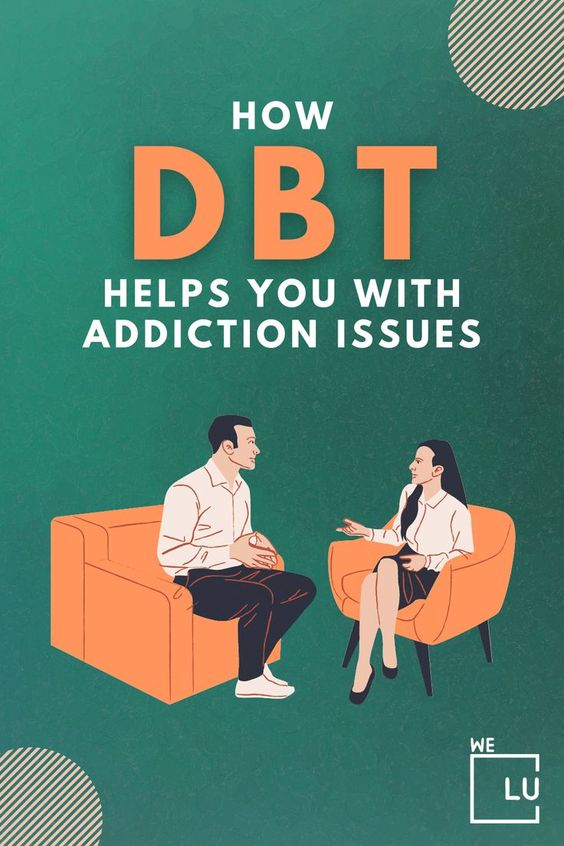What Is Dialectical Behavior Therapy (DBT)?
What is Dialectical Behaviour Therapy (DBT)?
Dialectical behavioral therapy (DBT) is an acceptance-based counseling approach used to treat various substance use and mental health issues. DBT is a type of therapy that Dr. Marsha Linehan developed in the 1980s. It was originally developed for borderline personality disorder (BPD) treatment. It takes inspiration from CBT, or cognitive behavioral therapy, also used to treat drug and alcohol addiction, with the added focus on teaching acceptance skills.
Now, individual and group treatments commonly employ dialectical behavioral therapy (DBT) for conditions such as depression, anxiety disorders, and substance use disorders (SUD), a medical condition defined by the uncontrollable use of substances despite the negative consequences. Multiple studies show that this updated approach, called DBT-SUD, can reduce drug use in people with borderline personality disorder, a mental disorder characterized by unstable relationships, distorted self-image, and impulsiveness.
The term “dialectical” means the interaction of conflicting ideas. Within DBT, “dialectical” refers to the integration of acceptance and change as necessities for improvement. Dialectical behavior therapy addresses the disorder’s symptoms by replacing maladaptive behaviors with healthier coping skills, such as mindfulness, interpersonal effectiveness, emotion regulation, and distress tolerance.

Get Your Life Back
Find Hope & Recovery. Get Safe Comfortable Detox, Addiction Rehab & Dual Diagnosis High-Quality Care.
Hotline(844) 597-1011How Does DBT Work?
DBT incorporates four skills to help individuals overcome their unhealthy behaviors and distressing thoughts. Each set of skills has its unique characteristics that help clients better understand their emotions.

Mindfulness
Mindfulness is a mental state characterized by being aware and accepting of the present moment, including our feelings, thoughts, and environment. Mindful individuals focus on the moment without judgment. Mindfulness is a skill that teaches clients to control their thoughts and to avoid letting their minds control their lives. They can use this skill and knowledge to better understand their emotions, maintain a positive mind, and effectively accept stress rather than push it away.
Interpersonal Effectiveness
Interpersonal effectiveness teaches individuals to deal with others in effective and healthy ways. People understand how to ask for something and say no when necessary. In doing so, clients learn how to handle difficult situations and improve communication and relationships.
Distress Tolerance
People who control or regulate their feelings and thoughts during tough times often make wise decisions. Others react to highly stressful situations in a hostile manner, which may lead to regrettable choices. Distress tolerance teaches a person to make sound decisions in stressful moments.
Through this module, therapists teach crisis survival skills to clients. This information helps distressed people avoid showing antagonistic behaviors that could worsen the problems. They learn to tolerate stress rather than change it.
Emotion Regulation
Emotion regulation helps individuals understand and regulate their emotions. This set of skills teaches individuals to better understand and express their feelings to alleviate psychological pain. The approach allows clients to avoid feeling overwhelmed by their thoughts.
Are you or somebody you know at serious risk of an overdose because of drug or alcohol abuse? If so, please call 911 right away. There are addiction rehab center addiction hotlines that can help guide you to proper local therapists & facilities.
SAMHSA TREATMENT HELPLINE
Struggling with substance use disorder? SAMHSA’s Addiction Treatment Helpline can connect you with proper help. (844) 597-1011
DRUG or ALCOHOL POISON CONTROL
If you’re experiencing or witnessing a drug- or alcohol-related poisoning, the poison control hotline can help. (844) 597-1011
Benefits of Dialectical Behavior Therapy
In DBT, the client and therapist work to resolve the obvious contradiction between self-acceptance and change to bring about positive results in the individual in treatment. Part of the DBT process involves offering validation, which helps individuals become more likely to cooperate and less likely to experience distress at the notion of change.
In practice, the therapist validates that an individual’s actions “make sense” within the context of their personal experiences without necessarily agreeing that the actions are the best approach to solving a problem.
Each therapeutic setting has its own goals and structure, but the characteristics of DBT can be found in individual psychotherapy and phone coaching.
- Acceptance and change: You’ll learn strategies to accept and tolerate your life circumstances, emotions, and yourself. You will also develop skills to help you make positive changes in your behaviors and interactions with others.
- Behavioral: You’ll learn to analyze problems or destructive behavior patterns and replace them with more healthy and effective ones.
- Cognitive: You’ll focus on changing thoughts and beliefs that are not effective or helpful.
- Collaboration: You’ll learn to communicate effectively and work together as a team (therapist, group therapist, psychiatrist).
- Skill sets: You’ll learn new skills to enhance your capabilities.
- Support: You’ll be encouraged to recognize your positive strengths and attributes and develop and use them.
Other Dialectical Behavior Therapy Benefits Include the Following:
- Replacing unhealthy behavior patterns with healthy ones
- Recognizing your strengths and applying them to all areas of your life
- Improving communication skills.
- Helping you feel more in control of your emotions, relationships, and life.
- Teaching you how to change negative thought processes to avoid impulsive reactions.
- Set priorities, say no, and ask for your needs.
- Implementing mindfulness techniques for better self-care and emotional regulation. You will learn to be more aware of what is happening inside and surrounding you. This will help you make informed decisions out of reason rather than impulse.
- Learning distress tolerance can help you sort through the things you can and cannot change. You make decisions based on facts and logic rather than your thoughts or feelings about a situation.

Dialectical Behavior Therapy Benefits in Addiction Treatment
DBT is beneficial in addiction treatment because it addresses harmful behaviors that hinder improving people’s lives. Within addiction treatment programs, DBT focuses on substance use and how it affects the quality of life, while also promoting target behaviors essential for overcoming addiction.
These behavioral targets include:
- Alleviating physical discomfort associated with withdrawal
- Avoiding triggers and cues related to substance use
- Community reinforcement of positive behaviors
- Decreasing substance use
- Reducing behaviors conducive to drug use, like momentarily giving up the goal to stop using drugs or alcohol, and instead functioning as if drug use can’t be avoided
- Reducing cravings and urges to use substances
What Can DBT Help With?
Dialectical behavioral therapy was created to primarily treat women with suicidal tendencies. Since its development nearly 40 years ago, DBT has proven to be most effective for treating individuals with borderline personality disorder (BPD) compared to other community-based behavioral therapy approaches. However, studies have shown that DBT is effective at treating other disorders. Researchers continue investigating DBT’s effectiveness with other mental health conditions besides BPD. These include:
- Attention-deficit/hyperactivity disorder (ADHD)
- Borderline personality disorder (BPD)
- Non-suicidal self-injury
- Substance use disorder
- Suicidal behavior
- Anxiety disorders
- Depression
- Eating disorders
- Bipolar disorder
- Substance use disorders
- Obsessive-compulsive disorder (OCD)
- Post-traumatic stress disorder (PTSD)
Get Help. Get Better. Get Your Life Back.
Searching for Accredited Drug and Alcohol Rehab Centers Near You?
Even if you have failed previously and relapsed, or are in the middle of a difficult crisis, we stand ready to support you. Our trusted behavioral health specialists will not give up on you. When you feel ready or just want someone to speak to about therapy alternatives to change your life call us. Even if we cannot assist you, we will lead you to wherever you can get support. There is no obligation. Call our hotline today.
(844) 597-1011Dialectical Behavior Therapy for Borderline Personality Disorder (BPD)
DBT was the first psychotherapy to be effective in treating BPD in controlled clinical trials, the most rigorous type of clinical research. DBT is the “gold standard” first-line treatment for borderline personality disorder.
Borderline personality disorder (BPD) is a mental health condition in which a person has long-term patterns of unstable or turbulent emotions. These inner experiences often result in impulsive actions and chaotic relationships with other people.
DBT is not a cure for borderline personality disorder, but it can be very effective for reducing or managing symptoms of the condition. One study found that 77% of people no longer met the criteria for BPD after a year of treatment with dialectical behavior therapy.
Dialectical Behavior Therapy for Self Harm
Self-harm refers to a person’s harming their own body on purpose. About 5% of people hurt themselves in this way. More females hurt themselves than males. A person who self-harms usually does not mean to kill himself or herself. But they are at higher risk of suicide if they do not get help.
Often, DBT therapists find themselves helping people learn to stop engaging in intentional self-harm. To start, DBT therapy helps someone understand what might lead to self-harm behaviors (in behaviorist terms, we want to know the antecedents).
Dialectical Behavior Therapy for Substance Abusers
While there is no conclusive evidence that DBT helps to treat a stand-alone drug or alcohol use disorder, studies indicate that DBT can be an effective component in an addiction care plan for individuals with substance use disorder and co-occurring mental health disorders.
Because many such patients have substance use disorders (SUDs), DBT for substance abusers incorporates concepts and modalities designed to promote abstinence and reduce relapses’ length and adverse impact.
Dialectical Behavior Therapy for Anxiety and Depression
Individuals with depression often experience mood changes and similar to borderline personality disorder, have an increased chance of suicide or self-harm behaviors. In a study in 2017 exploring the effectiveness of DBT’s emotional regulation and mindfulness skills in preventing depression relapse, researchers found that symptoms of depression were reduced.
Anxiety disorders involve strong fear or worry that can sometimes interfere with day-to-day life. This can sometimes lead to issues at home, work, and in relationships. DBT for anxiety focuses on teaching skills to cope with these feelings and manage emotions. DBT can successfully reduce anxiety symptoms. Developing DBT skills and psychological flexibility — staying in the moment — might also help improve anxiety symptoms.

Dialectical Behavior Therapy for Bipolar Disorder
Individuals with bipolar disorder experience changes in mood, behaviors, and thoughts. Suicidal thoughts are common in people with bipolar disorder, especially during depressive episodes. Though DBT isn’t one of the first-line therapies for bipolar disorder, experts are exploring how to adapt DBT skills for treating bipolar disorder. Research suggests that DBT improves symptoms of bipolar disorder I or II in people ages 18 or older.
Dialectical Behavior Therapy for post-traumatic stress disorder (PTSD)
Post-traumatic stress disorder (PTSD) can develop after experiencing a traumatic event, such as an accident, war, natural disaster, or violent assault. Similar to individuals with borderline personality disorder (BPD), people with PTSD can have trouble managing their emotions. Sometimes they have panic attacks, depression, and anxiety — all of which might increase their likelihood of self-harming behaviors or suicide. In DBT, the patient is taught skills to help regulate their emotional responses and reduce self-harming behaviors.
Dialectical Behavior Therapy vs Cognitive Behavioral Therapy
Many addiction treatment services focus on Dialectical Behavior Therapy (DBT) and Cognitive Behavioral Therapy CBT. Normally, clients will choose between DBT vs CBT with the help of their therapist or counselor. Cognitive Behavioral Therapy is often the first response to depression because it is so effective. Meanwhile, Dialectical Behavior Therapy is generally the top choice for borderline personality disorder.
Cognitive behavioral therapy (CBT) is also a top therapy for treating panic disorder, sleep problems, phobias, obsessive-compulsive disorder, and post-traumatic stress disorder (PTSD). Doctors use DBT for sexual trauma, self-harm behaviors, and suicidal ideation. While DBT focuses on mindfulness and emotional regulation, CBT centers around how feelings, thoughts, and behaviors impact each other. Both techniques are useful in treating mental disorders, so the right choice depends entirely on the individual’s unique situation and needs.
DBT and CBT are effective ways to treat addiction and mental illnesses. Choosing between DBT vs CBT depends entirely on your personal needs. When you enter a treatment program, an intake specialist will perform an initial assessment to determine the kinds of addiction therapy services you need. Then, you can begin your personalized treatment process.
We Level Up Addiction Treatment, and Mental Health Treatment Centers receive prestigious provider verifications and partnerships!
- We Level Up is a Psychology Today Verified Provider.
- We Level Up Joint Commission Accreditation.
- We Level Up FL Mental Health program is also CARF Accredited.
First-class Facilities & Amenities
World-class High-Quality Addiction & Mental Health Rehabilitation Treatment
Rehab Centers TourRenowned Addiction Centers. Serene Private Facilities. Inpatient rehab programs vary.
Addiction Helpline(844) 597-1011Proven recovery success experience, backed by a Team w/ History of:
15+
Years of Unified Experience
100s
5-Star Reviews Across Our Centers
10K
Recovery Success Stories Across Our Network
- Low Patient to Therapist Ratio
- Onsite Medical Detox Center
- Comprehensive Dual-Diagnosis Treatment
- Complimentary Family & Alumni Programs
- Coaching, Recovery & Personal Development Events
Dialectical Behavior Therapy Techniques
DBT uses three therapy approaches to teach the four core skills discussed above. Some believe this combination of techniques is part of what makes DBT so effective.
One-on-one therapy
DBT usually involves an hour of one-on-one therapy each week. In these sessions, you’ll talk with your therapist about whatever you’re working on or trying to manage. Your therapist will also use this time to build up your skills and help you navigate specific challenges.
Skills training
DBT involves a skills training group, similar to a group therapy session. Skills groups usually meet once a week for two to three hours. The meetings generally last 24 weeks, but many DBT programs repeat the skills training so the program lasts a full year. During skills group, you’ll learn about and practice each skill, talking through scenarios with others in your group. This is one of the key components of DBT.
Phone Coaching
Some therapists also offer phone coaching for extra support between your one-on-one appointments. This might be a good thing to have in your back pocket if you often feel overwhelmed or just need extra support. Over the phone, your therapist will guide you through how to use your DBT skills to tackle the challenge.
DBT Activities for Addiction
Before engaging in DBT activities for addiction, a health care professional generally explains the process of this substance abuse treatment approach. The therapist and client collaborate to develop realistic goals for each of the four stages of therapy.
Stage One
During stage one of DBT activities for addiction, individuals strive to gain control over their reckless behaviors, which could include heavy drinking or drug abuse. Those entering this level of therapy often have a history of self-harming, suicidal thoughts, or mental illness.
Stage one is designed to help people overcome these behaviors and achieve stability. It also aims to decrease behaviors that interfere with therapy. Through this stage, clients learn to increase their ability to manage stress and effectively interact with others.

Stage Two
Those in stage two of DBT activities for addiction have learned to manage their behaviors, but their emotional health remains an issue. They often suffer in silence. Upon entering this level of therapy, people may experience drug or alcohol abuse, have symptoms of an eating disorder, or engage in non-suicidal self-injury.
During the second stage, clients develop goals to be achieved during therapy. These targets are contingent on the severity of existing problems and their relationships. Individuals also learn self-validation techniques and maintain focus and control emotional stress.
Stage two aims to relieve traumatic stress. For example, a therapist may help someone with post-traumatic stress disorder and alcohol dependence through behavioral analyses, exposure therapy, and techniques to improve self-validation and mindfulness.
Stage Three
People in stage three of DBT activities for addiction often have problems with achieving happiness. In response, therapists help clients increase self-respect and self-esteem, identify life goals, and recognize an average balance of happiness and unhappiness.
Stage Four
Many people have trouble achieving a sense of connectedness, joy, and freedom. Stage four of DBT activities for addiction uses long-term psychotherapy to help individuals overcome these feelings and live a life of spiritual fulfillment.
Effectiveness of Dialectical Behavior Therapy
While Dialectical Behavioral Therapy research has focused on borderline personality disorder for years, it is also a proven treatment option for other mental health conditions, including addiction. This therapy is effective for any age, sex, orientation, and race.
Everyone is different, and the therapist will adapt any treatment to fit the patient’s needs. To find out if DBT works for you, call one of our treatment specialists today. They will evaluate symptoms, treatment history, and therapy goals to see if Dialectical Behavioral Therapy is the right solution for you or your loved one.
World-class, Accredited, 5-Star Reviewed, Effective Addiction & Mental Health Programs. Complete Behavioral Health Inpatient Rehab, Detox plus Co-occuring Disorders Therapy.
CALL(844) 597-1011End the Addiction Pain. End the Emotional Rollercoaster. Get Your Life Back. Start Drug, Alcohol & Dual Diagnosis Mental Health Treatment Now. Get Free No-obligation Guidance by Substance Abuse Specialists Who Understand Addiction & Mental Health Recovery & Know How to Help.
Dialectical Behavior Therapy Cost
The cost for dialectical behavior therapy varies depending on the dual diagnosis treatment facility and whether you have insurance. Some inpatient treatment facilities provide the DBT service as part of the treatment program, while others may require a single payment at the beginning of each session. In addition, some fees are nonrefundable once they have been paid even if you discontinue the program.
Use your insurance plan. Most private insurance plans also offer at least partial—if not full—coverage for this type of care. Depending on your insurance coverage you might be able to offset a significant portion of the costs.
It’s recommended to call your health insurance provider to get an estimate for how much of the inpatient treatment they’ll pay for. We understand that going through your insurance policy can be challenging, time-consuming, and frustrating. Fortunately, you don’t have to do it alone. At We Level Up our admissions staff works with many private insurance customers during the admissions process. Learn more about your coverage by clicking on your insurance provider below:
Dialectical Behavior Therapy Residential Treatment Centers
Dialectical behavior therapy (DBT)can be essential in residential treatment for individuals who want to adapt to new feelings of sobriety. Those who use addictive substances usually mask their emotions. Someone who doesn’t know how to deal with these emotions will likely turn to drugs or alcohol to cope.
The purpose of residential treatment is to retrain the mind of someone who has been actively using drugs for long periods, and by implementing such practices, those can leave treatment, in essence, with a blank slate. They will have a new outlook that allows them to cope with the emotions and hardships they were running from before treatment.
DBT has a high success rate in residential addiction treatment because the client will learn to articulate, pursue, envision, and sustain goals unique to their history of out-of-control behaviors, including alcohol or drug abuse, and can deal with everyday life problems. DBT emphasizes building a life worth living.
DBT is just one form of therapy; however, that is used to recover from drug or alcohol addiction. It should not be the only therapy that treats addiction. An established treatment provider will use various techniques and evidence-based therapies, including CBT, 12-step programs, and more. The creation of DBT has been an essential portion of treating addiction and will continue to do so as more people struggle with addiction.

DBT in Dual Diagnosis Treatment Programs
Many individuals struggling with addiction also have another underlying mental health condition. When someone is diagnosed with other disorders along with addiction, it is referred to as dual diagnosis or co-occurring disorders. Co-occurring disorders with addiction must be treated simultaneously. If the underlying condition leads to substance abuse and is left untreated, the person will return to drugs or alcohol because the original trigger was not handled. Finding success in sobriety can be more difficult for those with a dual diagnosis, but the right therapies can help get them on that path. DBT provides the skills and methods to sustain long-term recovery.
Dialectical behavior therapy benefits people to develop skills to handle intense emotions and stressful situations and maintain healthy relationships. These skills can help someone balance their emotions and state of mind to prevent damaging behaviors. DBT provides the opportunity to learn to handle emotions that may have led to substance abuse or other damaging actions.
We Level Up rehab centers use individualized treatment plans for each client to ensure they can succeed in recovery. We know there is no one-size-fits-all recovery method. Treatment plans consider the substance that was abused, co-occurring disorders, past traumas, past treatments, and future planning that may be needed. We Level Up dual diagnosis treatment centers has medical detox, MAT, residential or inpatient rehab treatment, and aftercare planning programs for those struggling with drug and alcohol addiction. If you or a loved one are struggling with addiction, call our 24/7 admissions team.
Experience Transformative Recovery at We Level Up Treatment Centers.
See our authentic success stories. Get inspired. Get the help you deserve.
Start a New Life
Begin with a free call to an addiction & behavioral health treatment advisor. Learn more about our dual-diagnosis programs. The We Level Up Treatment Center Network delivers recovery programs that vary by each treatment facility. Call to learn more.
- Personalized Care
- Caring Accountable Staff
- World-class Amenities
- Licensed & Accredited
- Renowned w/ 100s 5-Star Reviews
We’ll Call You
Sources:
[1] NCBI – https://www.ncbi.nlm.nih.gov/pmc/articles/PMC2797106/
[2] NIAAA – https://pubs.niaaa.nih.gov/publications/ProjectMatch/match03.pdf
[3] NCBI – https://www.ncbi.nlm.nih.gov/pmc/articles/PMC2963469/
[4]DBT Drug Addiction – We Level Up NJ


